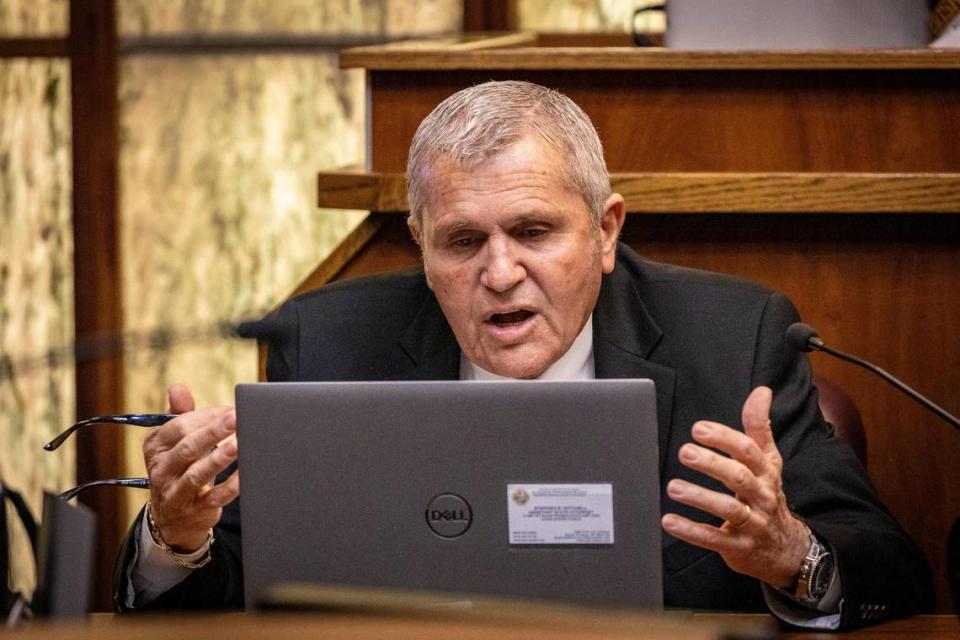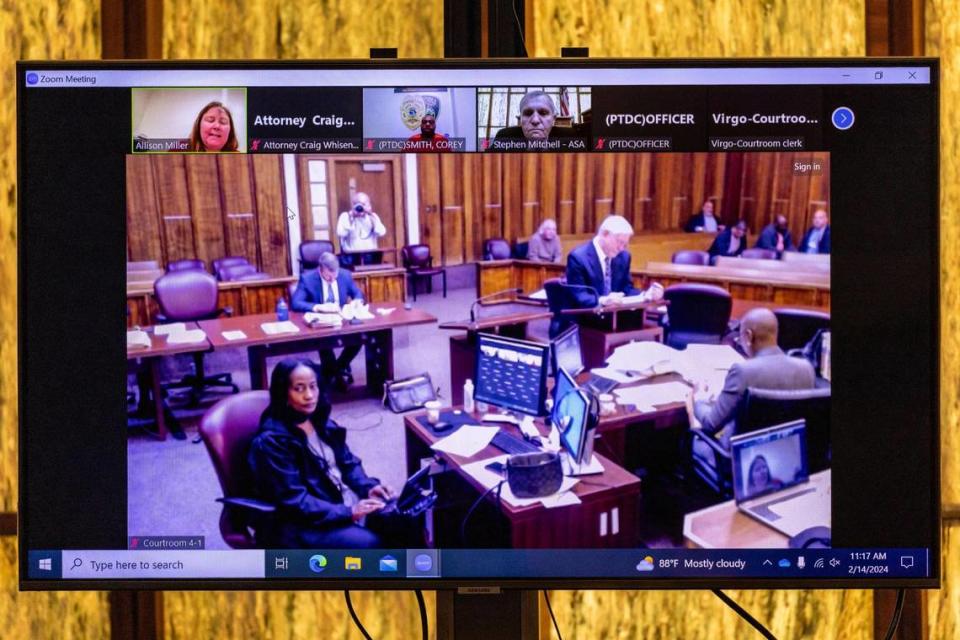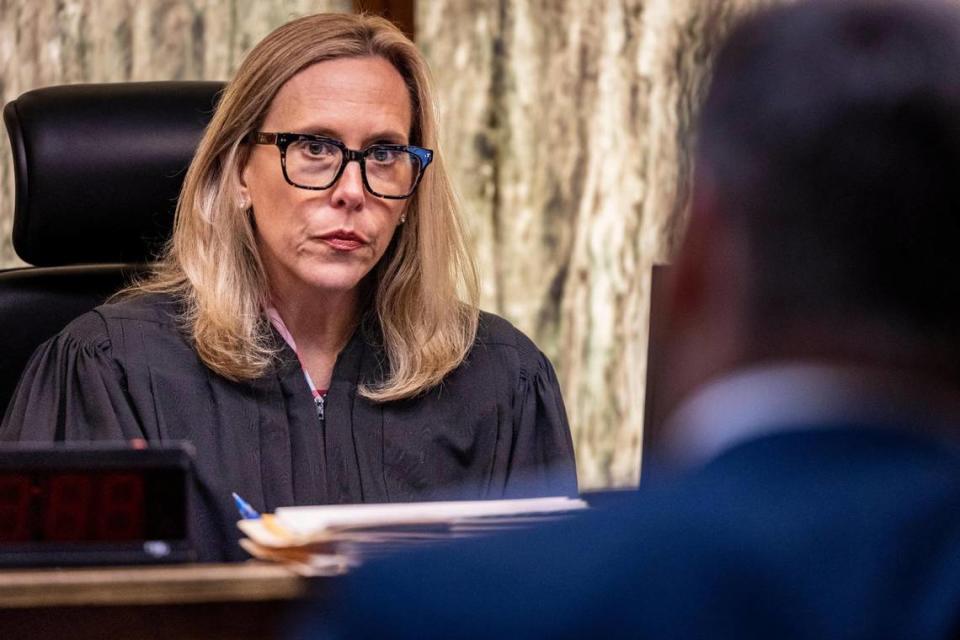John Doe gang boss on death row for murders. Can Miami prosecutors fairly retry case?
Defense attorneys for one of South Florida’s most notorious convicted gang leaders are trying to convince a judge that the Miami-Dade State Attorney’s Office is too compromised to participate in the retrial of a two-decade old death penalty verdict.
Attorneys for Corey Smith — convicted in state court of four murders, though suspected of taking part in many more — argued that the state attorney should recuse itself from the case because it allowed “favors” to potential witnesses who prosecutors were trying to turn against Smith before his 2004 murder trial.
The defense team considers a document placed in discovery two months before the trial began by then-Miami-Dade Assistant State Attorney Bronwyn Miller — but apparently not noticed then by Smith’s defense attorneys — a major piece of evidence that bolsters their argument. It says that during briefings, “civilian witnesses” were given food, beverages and Black & Mild cigars. Miller became a judge in 2005 and currently serves on the Third District Court of Appeal.
One witness, Demetrius Jones, testified last week that he had sexual contact with a woman in the main conference room of Miami’s homicide bureau, a large room with a large window that looks out onto the detectives’ desks.
In 1999, Smith was convicted in federal court of drug and firearm charges. A year later a Miami-Dade grand jury indicted Smith and seven others on 17 counts for crimes committed in connection with Liberty City’s violent John Doe drug gang.
By 2004, Smith was found guilty of four murders by a Miami-Dade jury. He was sentenced to death in 2005.
His high-profile Miami-Dade trial — heavily armed law enforcement flooded the courthouse and Smith wore a stun belt to court each day to prevent his escape — came five years after the federal government tried to dismantle the John Does, named for the toe tags tied to unidentified bodies at the morgue.

During testimony at this week’s hearing, Smith’s former defense attorney Jimmy DellaFera said the first time he learned of then-Assistant State Attorney Miller’s memo was last week when defense attorneys forwarded him a copy. Had he been aware of the memo, he said he would have asked for the names of anyone who might have received a “favor.”
“If I was aware, I would have asked to take depositions,” DellaFera said.
Miller appeared as a witness earlier this week, a rarity among judges. Her answers were curt and to the point. The judge said she prepared witnesses prior to the trial almost daily at the Miami Police Department or in a jury room. Asked if she knew about or ever witnessed anyone drinking alcohol or having sex, she said, “No.”
Defense attorneys have also produced affidavits signed by Smith’s former girlfriend and a former drug dealer with the John Does, both of whom testified against Smith at trial. The affidavits claim the two mingled and conspired with other witnesses at the Miami Police Department before they testified against Smith.
State prosecutors Stephen Mitchell and Michael Von Zamft counter that Smith’s former girlfriend Tricia Geter and former drug dealer Anthony Fail signed the affidavits because Smith had created a “hit list” and they feared for their lives.
Kevin Rodriguez, a former Miami-Dade organized crime detective who developed a rapport with Geter, testified that Geter told him she feared Smith would kill her. Rodriguez also testified that Geter told him that Smith continues to have pull with jail guards and came up with a system in which he speaks to Geter weekly without being recorded by using burner cellphones supplied by guards.
“We also had additional law enforcement sources who supported Geter, saying Smith [still] has reach at jail and in law enforcement,” Rodriguez said.

Supreme Court and Florida’s death penalty law
Smith’s re-sentencing, now tentatively scheduled for June, is the cascading effect of a 2016 U.S. Supreme Court ruling that struck down Florida’s death penalty law. In an 8-1 vote, justices ruled Florida’s law unconstitutional because it only required a bare majority vote.
The next year, Florida’s Supreme Court adopted the ruling and ordered new sentencing trials for two of Smith’s cases in which he was sentenced to death by non-majority votes,. But even as the state and Smith’s defense prepared for a new trial, the law was again upended in early 2023.
This time, seething from Marjory Stoneman Douglas High School convicted killer Nikolas Cruz’s life sentence, Florida Gov. Ron DeSantis and state legislators changed the death penalty law to only require a super-majority 8-4 vote for death, with jurors also having to vote unanimously on an aggravating factor like the crime being unusually cruel and heinous.
Smith’s is one of almost two dozen death penalty sentences expected to be retried in Miami-Dade.
Deadly control of Miami’s drug trade
The murders for which Smith was convicted were part of the John Does’ war for control over Miami’s drug trade in the 1990s.
▪ Leon Hadley, who ran the Liberty City drug holes Smith’s gang was fighting to take over, was killed in a drive-by shooting after he threatened Smith and a co-hort.
▪ John Doe “watchout” Jackie Pope stated in a deposition that a John Doe member shot a police officer at one of the drug holes. Pope’s body was later riddled by 16 bullets from John Doe “hit men,” according to a federal indictment.
▪ Though Cynthia Brown’s death was staged to look like an overdose, a coroner determined that the potential witness against Smith had been suffocated in a hotel room.
▪ Angel Wilson was killed when a car pulled up to her vehicle in Liberty City and peppered it with almost four dozen rounds from an AK-47. Smith thought he had killed Fail, a former associate whose breakup with the gang threw Smith into a rage.
During the sentencing phase of the trial, Smith received life sentences for the murders of Hadley and Pope. He was sentenced to death by a 10-2 margin for his role in Brown’s murder and by a 9-3 vote for the murder of Wilson.
Judge Wolfson is expected to rule on the defense motion on Feb. 28, after the two sides give closing arguments.


